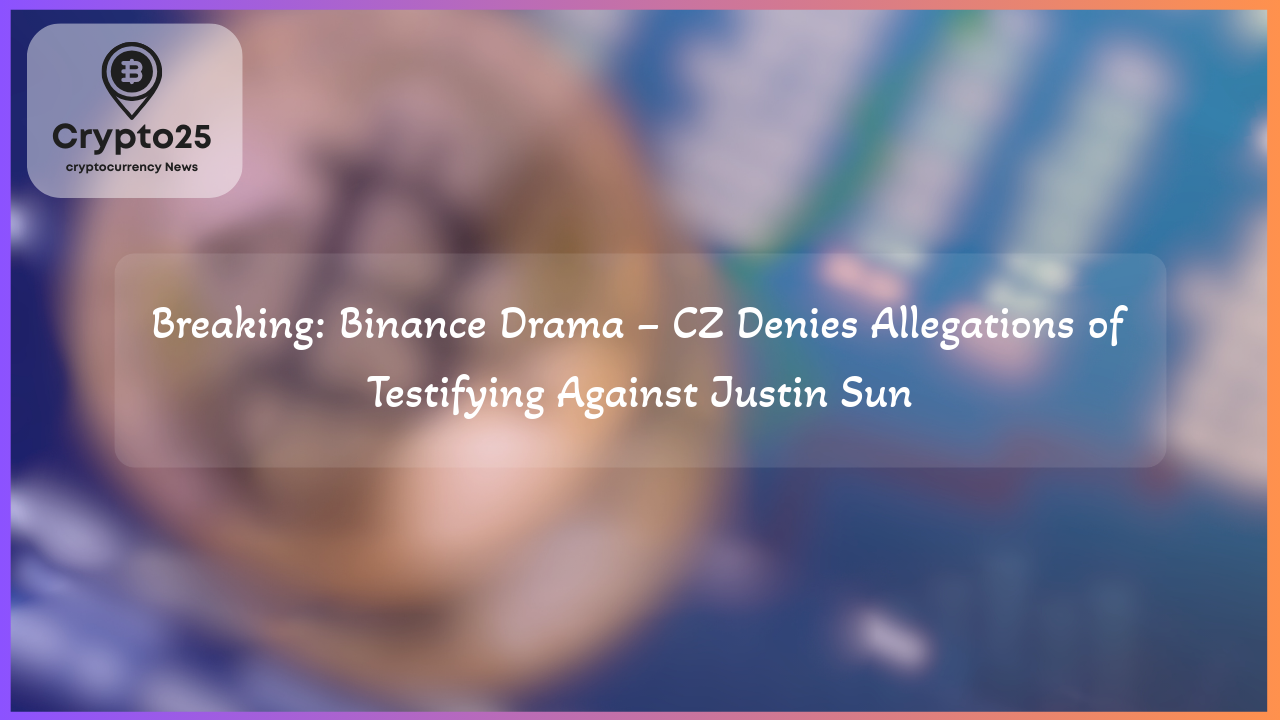
In recent days, the crypto community has been abuzz with allegations surrounding prominent figures such as former Binance CEO Changpeng Zhao (CZ) and Tron founder Justin Sun. Reports by the Wall Street Journal claimed that Zhao had cooperated with U.S. authorities to testify against Sun as part of a 2023 plea bargain. However, both CZ and Sun have vehemently denied these claims, calling the reports “baseless.”
### Changpeng Zhao Denies Wall Street Journal Allegations
Changpeng Zhao, widely known as CZ, has been under scrutiny following a report by the Wall Street Journal alleging that he provided evidence against Justin Sun to gain leniency from U.S. prosecutors. According to the publication, Zhao’s alleged cooperation was tied to plea agreements related to money laundering violations, for which he served a brief prison sentence in 2023. In a strongly worded rebuttal on Twitter, CZ dismissed the claims, accusing the Wall Street Journal of publishing “hit pieces” based on unreliable information.
Zhao further clarified that the report lacked credibility, criticizing how the narrative failed to align with the realities of his legal case. He insinuated that external influences might have played a role in the publication of such an article and reiterated his commitment to transparency in his dealings within the cryptocurrency industry.
### Justin Sun’s Response and His Connection with Binance
Justin Sun, the founder of the Tron blockchain, also responded to the allegations, describing them as fictitious and harmful to his reputation. Sun referred to Zhao as both a mentor and a close ally, highlighting CZ’s significant support throughout his entrepreneurial efforts. This defense aligns with Sun’s vision of a decentralized future powered by robust collaborations within the crypto community.
These allegations surfaced amidst increased regulatory pressures and scrutiny of Binance. Reports suggest that Binance has been holding meetings with U.S. government officials concerning various compliance issues. Discussions allegedly included the possibility of removing a U.S.-appointed monitor overseeing Binance’s adherence to anti-money-laundering measures. While U.S. officials have confirmed these meetings, the company has labeled additional allegations against them, including those targeting CZ’s relationship with Sun, as “unsubstantiated.”
### U.S. Regulatory Scrutiny and Binance’s Response
The Wall Street Journal also reported that Binance has been discussing listing a new stablecoin project, USD1, which is reportedly linked to World Liberty Financial—a decentralized finance venture with ties to high-profile investors, including Justin Sun. Such discussions may raise questions about potential conflicts of interest, given Binance’s ongoing compliance evaluations with the Treasury Department.
In response, Binance has maintained that these conversations are part of routine operations and that their compliance system remains intact. The company continues to argue that the U.S.-mandated monitoring requirements introduce inefficiencies and costly operational burdens. Nevertheless, regulators remain cautious, especially in light of previous cases, such as the Justice Department’s disbanding of its specialized cryptocurrency team, which oversaw the 2023 prosecution of Binance.
| Title | Details |
|---|---|
| Market Cap | $1.2 Trillion |
Reports of alleged pardon requests for Zhao have further complicated Binance’s relationship with regulators. The company categorically denied any efforts to secure presidential pardons or similar leniency agreements. Meanwhile, official bodies such as the U.S. Department of Justice and the White House have neither confirmed nor denied such reports, citing an ongoing commitment to maintaining neutrality in ongoing investigations.
### Implications for the Crypto Community and Market Sentiment
These allegations come at a time when the reputation of the cryptocurrency industry continues to face intense scrutiny. Binance remains one of the largest cryptocurrency exchanges globally, and accusations involving its leadership inevitably impact public trust in the market. Despite strong rebuttals from Zhao and Sun, market participants are closely monitoring developments to assess any potential implications for Binance’s operations and the broader crypto ecosystem.
The situation also underscores the tension between the growing regulatory oversight of digital assets and the industry’s drive for innovation. Regulatory strategies that include corporate monitorships, as evidenced in Binance’s case, present challenges to major platforms while seeking to ensure compliance with anti-money laundering and other financial laws.
As the crypto sector matures, transparency and cooperation between private entities and regulators will remain pivotal. For now, however, the controversy surrounding CZ, Sun, and Binance casts a spotlight on the evolving dynamics within the crypto space, leaving stakeholders to weigh these developments carefully. This unfolding saga is a strong reminder of the intricate balance required to navigate both trust and innovation in the world of digital finance.
